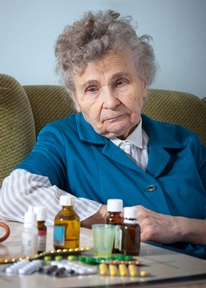Elderly less likely to be offered talking therapy for depression
Older people are more likely to be offered antidepressants and less likely to be offered talking therapies, than younger people, according to new research.

The study carried out by University College London (UCL) and Bristol University found despite older people saying they preferred talking therapies such as counselling, they are less likely to be referred than younger adults, particularly when they are aged 80 and over.
Researchers looked at 27 studies and found due to limited time in consultations and more complex needs, GPs and nurses often prioritised physical health over mental health, particularly when it came to frail patients.
Dr Rachael Frost from UCL Institute of Epidemiology & Health Care, lead author of the paper, said: "There needs to be greater access to talking therapies for older people suffering with depression."
In addition, she and her fellow researchers called for late-life depression to be given more priority as well as more training for healthcare professionals and increased investment in psychological therapies.
Late-life depression is highly prevalent with up to nine per cent of adults aged 75 and over having a major depressive disorder, according to the study. Eighty-seven per cent of people with late-life depression are prescribed antidepressants. This is despite them expressing a preference for talking therapies. Recorded referrals are as low as 3.5 per cent with those aged 85 and over five times less likely to referred for talking therapies as those aged 55-59.
Professor Helen Stokes-Lampard, chair of the Royal College of GPs, responded to the study, saying: “GPs are highly-trained to prescribe and will only ever recommend antidepressants after a full and frank discussion with the patient sitting in front of us, based on their individual circumstances, and if we genuinely believe they will help them.
“We do know that for many older patients, the underlying reasons for them visiting their GP might not be medical – they might be feeling lonely or be socially isolated. In these cases, it's important that we have access to 'social prescribing' schemes to link these patients with an appropriate class or group in the community, that can have a positive effect on their health and wellbeing, and we welcome the focus on this in the NHS long term plan.”
NHS England has promised that every GP practice in England will have access to one of 3,000 new mental health therapists by 2021. Professor Stokes-Lampard added: “We need this, and the other pledges of more investment in general practice and more GPs made in the GP Forward View and NHS long term plan delivered as a matter of urgency."
The study ‘Management of depression and referral of older people to psychological therapies: a systematic review of qualitative studies’ was published in the British Journal of General Practice.
Latest News
 29-Jul-24
Dementia Bus gives carehome.co.uk staff insight into life with dementia
29-Jul-24
Dementia Bus gives carehome.co.uk staff insight into life with dementia
 01-Mar-24
Find out the top care homes in 2024
01-Mar-24
Find out the top care homes in 2024
 21-Mar-23
UK's top care homes in 2023 revealed
21-Mar-23
UK's top care homes in 2023 revealed
 03-Jan-23
carehome.co.uk launches free care helpline
03-Jan-23
carehome.co.uk launches free care helpline
 13-Dec-22
5 mins with Emily Whitehurst, chief operating officer for Constantia Healthcare
13-Dec-22
5 mins with Emily Whitehurst, chief operating officer for Constantia Healthcare